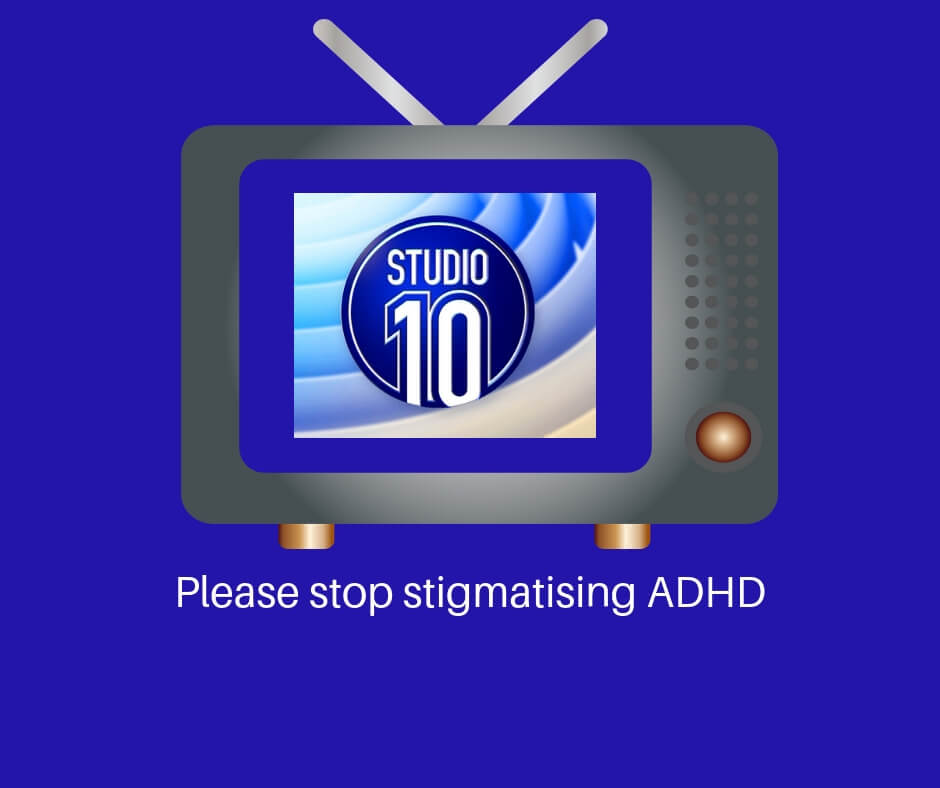
An Open Letter to Studio 10 – Please Stop Stigmatising ADHD
Dear Natarsha, Kerri-Anne, Angela, Joe, and Denise
I’d like to introduce myself. My name is Lou Brown. I am a 50-year-old Australian woman with ADHD. I also have a 10-year-old son who has ADHD.
As a member of the ADHD community, a group that often feels marginalised and misunderstood, I am writing to express my concerns about the superficial, inaccurate and stigmatising manner in which you recently discussed ADHD on your show Studio 10.
Specifically, I am concerned that the bias and inaccuracy of your coverage may prevent or discourage people from seeking assessment for ADHD for themselves or their children, as well as the support they require to live a full and happy life. I am also concerned that the language and tone the panel used when discussing ADHD, may serve to further increase stigma and feelings of shame and self-blame in those who have already been diagnosed with the disorder and are receiving treatment.
Misunderstanding and misrepresentation of the scientific evidence around the disorder, vastly contributes to increasing and perpetuating social stigma. According to the research this stigma is dangerous as it has been show to:
- Influence whether a parent decides to have their child assessed for ADHD or not.
- Lead to parents underestimating the risks involved with having poorly treated ADHD.
- Muddy the truth around best practice evidence-based ADHD treatment options.
- Interfere with parents being able to make informed and educated decisions around how to best support their child with ADHD.
- Affect treatment adherence and treatment efficiency.
As a parent this is very concerning. Poorly managed ADHD symptoms can greatly affect a child’s ability to self-reflect, develop self-awareness and accurate self-perception; to communicate effectively; to think socially; to interact with others; be accepted by others and form bonded relationships; to participate fully in extracurricular activities; and, to develop independence. Their symptoms can also negatively impact upon parent-child and child-sibling relationships, upon family function and of course, on their own self-esteem and self-worth.
For example, poorly managed ADHD symptoms can negatively affect a child’s academic achievement as they impact directly on a child’s ability to:
- Sustain focus and concentration (especially if a task is boring or tedious).
- Absorb, process and recall information.
- Prioritise, plan and problem solve.
- Work out what piece of information they should pay attention to (as they struggle to filter the information they receive from their internal world and from the world around them for relevance).
- Stay on track and complete tasks to fruition, as well as transition away or disengage from tasks they are absorbed in.
- Pause and inhibit their words and actions (which can contribute to impulsive decision making, careless errors, accidents and injuries, and social violations such as interrupting others or blurting out answers in class).
- Inhibit and regulate/modulate their emotions.
- Deal with delay aversion due to their inability to cope with discomfort (which may contribute to them acting impulsively in order to terminate the delay i.e. pushing in; interrupting or badgering others; opting for immediate smaller rewards rather than delaying gratification in order to achieve long term goals).
- Perceive time and regulate their attention, behaviour and motivation relative to time.
- Interact effectively with their peers.
As a result, a child with ADHD’s self-esteem and quality of life can suffer, for when children with ADHD are:
- Unable to meet the expectations placed upon them and therefore experience failure over and over again (even when they are trying their hardest).
- Constantly on the receiving end of correction, redirection, criticism (and possibly social rejection and isolation).
they are more likely to feel frustrated, embarrassed, humiliated, demoralised and discouraged, as well as ashamed, inadequate, unworthy and regretful. They may also come to believe over time that they are fundamentally different, flawed or broken, and begin to anticipate or predict future failure (Barkley, 2015).
Additionally, poorly treated ADHD in childhood increases the risk individuals with the disorder developing anxiety and depression, alcohol and substance abuse issues, and eating disorders in adolescence and adulthood. Risks are also increased for criminality, self-harm and suicide, with the suicide risk of individuals with ADHD being approximately 1.8 times higher than the general population (Barbaresi et al., 2013).
Not surprisingly, these outcomes are not ones any of the ADHD community wants for our kids. Therefore, I would like to take this opportunity to address some of your comments, as well as provide you with some evidence based-information that may assist you in discussing ADHD in a more informed manner in the future.
Let’s start here:
“Are parents, teachers and doctors taking the easy way out in dealing with kids immature behaviour? Some experts are warning doctors and schools may be using ADHD drugs to medicate immature children. A new study has found that kids who are the youngest in the class are twice as likely than their older friends to be diagnosed with Attention Deficit Hyperactivity Disorder.” ~ Natarsha Belling.
Segueing into a discussion on ADHD is this manner is problematic, as by asking a rhetorical question you automatically promote judgement and fear mongering in your audience and lead them towards an inferred conclusion, regardless of its accuracy.
Additionally, the validity of the study’s assertion you refer to in the segue and go onto discuss further in the segment, is questionable. Firstly, the study was conducted by a well know anti-ADHD campaigner, Martin Whitely, who has no medical, psychiatric or scientific qualifications, as well as a clear agenda. Secondly, the study does not provide evidence to show that kids who are the youngest in their class are being misdiagnosed with ADHD. Thirdly, you could postulate that it makes perfect sense why ADHD diagnosis rates would be higher in kids with late-birthdays and that kids with ADHD who are the oldest in their class may be at risk of not being identified.
Let me explain.
Being a neurobiological disorder, the symptoms individuals with ADHD express are associated with deficits in executive control (or self-control) arising from the lag in neurodevelopment, as well as differences in neural structure, connectivity, and function. Research indicates individuals with ADHD typically develop their executive functions more slowly than their neurotypical peers (30-40% or 2-3 years behind their peers). Additionally, two thirds of individuals with ADHD only develop 70-80% of the executive function capacity of neurotypical individuals.
For clarity, your executive functions are the mental processes you rely on to regulate your thoughts, words, actions and emotions. And to perceive and sense time, as well as regulate your behaviour across time in order to achieve your goals.
If you combine the effect this developmental lag has on a child with ADHD executive control with their decreased maturity due to their chronological age (which in itself can affect a child’s ability to cope with the cognitive, emotional and social challenges associated with school), a child’s ability to meet the same expectations placed on their peer group will be further compromised and as a result their ADHD symptoms will become more obvious.
It is also important to note that ADHD is not always easy to spot as not all children display hyperactive-impulsive tendencies. In fact, the Australian data shows the majority of kids in Australia with ADHD fit the inattentive criteria. These kids are at greater risk of going undiagnosed and therefore often do not receive the treatment and support they require to negotiate life successfully.
“We have a problem with over diagnosis…” Joe Hildebrand.
Here are the stats from the 2015 Australian Child and Adolescent Survey of Mental Health and Wellbeing that provide further information about the prevalence of ADHD in Australia.
During the study:
- 4% of children and adolescents in Australia were found to have an ADHD diagnosis – the equivalent to an estimated 298,000 children and adolescents. [A meta-analysis of 175 research studies worldwide on ADHD prevalence in children aged 18 and under found an overall pooled estimate of 7.2% (Thomas et al. 2015). Hence ADHD is Australia is not over diagnosed in children as the prevalence statistics in Australia align closely with worldwide prevalence data.]
- Of the three sub-types of ADHD, inattentive type was the most common, with 3.4% of children and adolescents having inattentive type, 1.2% hyperactive type and 2.8% combined type.
“I do think a lot of people jump on that ADHD. I actually do believe in it. I do think it has to be extremely selective.”~ Kerri-Anne Kennerley.
Firstly, thank you Kerri-Anne for stating that you believe in ADHD. However, I must disagree with your statement that a lot of people jump on the ADHD bandwagon. If anything, the opposite is true as due to the stigma surrounding the disorder the research shows parents often shy away from having their kids assessed for ADHD. Additionally, if they do go ahead and their child is diagnosed, parents typically experience a period of denial and grief before guardedly accepting their child’s diagnosis. They also tend to agonise over whether or not to incorporate medication into their child’s treatment plan (Taylor, Donoghue & Houghton, 2006).
“I hate the idea of medicating kids. And I just think it happens way too often.” ~ Angela Bishop.
Yep! Don’t we all! I have never met a parent who has wanted to give their child medication. However, if we want our kids to thrive sometimes we have no choice. In public discourse around ADHD, the trope of the parent who employs ‘cosmetic pharmacology’ to subdue their child into compliance is, not only an insidious version of mother-blaming, but an urban myth.
Furthermore, whilst children with mild ADHD symptoms may respond well to behaviour interventions, such as parenting from an ADHD perspective and class room strategies alone, the research clearly shows children with moderate to severe ADHD symptoms tend to experience little improvement when these interventions are implemented in isolation.
Stimulant medication, which is one of the most comprehensively researched medications on the market, is the most commonly prescribed and most effective class of medication used to treat the symptoms of ADHD. Whilst it does not cure ADHD, studies have consistently shown it improves an individual with ADHD’s ability to function (Barkley, 2015; DeVito et al, 2008) as it:
- Successfully reduces ADHD symptoms, including hyperactivity, impulsivity and distractibility.
- May improve short term memory, learning performance, emotional regulation, social skills and peer relations.
- Can lead to an increase in self-esteem.
The dose prescribed is very low and does not produce the euphoric effects associated with drug abuse in individuals with ADHD. In addition to this, according to Barkley (2015) stimulant medication produces few mild negative side effects. However, if a child does experience negative side effects, they either develop tolerance for these symptoms or their symptoms can be reduced to a tolerable level by lowering their medication dose. Occasionally, changing to another stimulant medication (or non-stimulant medication) may be required.
Furthermore, despite concerns about the long-term effects of ADHD medication, research suggests it does not harm a child with ADHD’s brain nor does it adversely affect the development of the brain’s cerebral cortex (the part of the brain responsible for one’s executive functions) (Barkley, 2015). Instead, there is exciting evidence emerging that suggests stimulant medication may have a protective effect on a child’s brain, as there are over 32 studies that show the brains of kids with ADHD who continuously take stimulant medications in the long term, develop in a manner that is more in line with their neurotypical peers. In other words, stimulant medication appears to promote brain development (Barkley, 2015a).
It is also important to note that specialists do not recommend stimulant medication be relied upon as the only form of ADHD treatment. Instead, the data indicates that taking a multimodal approach to ADHD treatment is important for the following reasons (Chronis et al., 2006; Pelham 1999; Pelham et al., 1998, cited in Barkley, 2015):
- Stimulant medication does not provide 24 hours a day coverage.
- Medication alone does not teach children and adolescents with ADHD the skills they need to function more competently. Whilst behaviour treatment alone is ineffective when children and adolescents are unable to focus in order to absorb information and learn from interventions or instructions.
- Children and adolescents with ADHD experience problems across multiple domains and these problems may respond differently to treatments. For example, stimulant medication has been shown to reduce ADHD symptoms, whilst psychosocial interventions appear to have more impact on family relationships and academic functioning.
- Normalisation is rare with any singular treatment but there is some indication that combined treatments increase the chance of normalisation.
“And they have studies that have demonstrated the prevalence for children who are medicated for ADHD going on to harder drugs when they go into their teens.” ~ Angela Bishop.
Whilst the research suggests that individuals with ADHD who do not received pharmacological treatment are at a significantly higher risk of developing substance abuse, claims that stimulant medication increases the risk of later substance abuse appear to be unfounded (Barkley, Fischer, Smallish & Fletcher, 2003; Biederman et a., 2008; Shier, Reichenbacher, Ghuman & Ghuman, 2103). Instead, the data suggests stimulant medication may significantly reduce substance abuse risk in individuals with ADHD (Chang et al, 2014; Walitza, Warnke, Greenhill & Gerlach, 2014; Wilens et al. 2003). For example, in their 2016 study, McCabe et al.(2016) concluded when stimulant medication treatment is started early (before age 9) and continued for more than 6 years, it may cut the rate of substance abuse in half. In fact they found, stimulant medication reduced the risk of substance abuse in youth with ADHD back to the same level of risk associated youth without ADHD. (Please note: when taken at therapeutic doses, stimulant medication does not produce the euphoric effects associated with drug abuse in individuals with ADHD).
“The problem is we are medicalising behaviours. So we are … a range of what is normal behaviours as things that need to be cured or fixed.” ~ Joe Hildebrand.
Whilst it is common for everyone to occasionally be impulsive or inattentive, to be diagnosed with ADHD a child must be more frequently challenged and more severely impaired by these behaviours in comparison to other kids of the same age or developmental stage. These behaviours also have to be present before the age of 12, present for greater than 6 months and cause significant impairment in more than one life domain (i.e. school and home life). Additionally, as indicated above these behaviours are only the tip of the ADHD iceberg.
“If I’m unhappy with my child I want to be able to take them to a paediatrician and get it fixed. Just like I would with my car or any other product.” ~ Joe Hildebrand.
Sorry, but a child is not something to be fixed. But a living breathing human being that deserves to receive whatever treatment and support they require to develop in a healthy manner and go on to live a full and rewarding life. What parent who truly loves their child would not want this for them?
Nor is obtaining an ADHD diagnosis a quick or easy process. (Sorry Natarsha but you cannot just see a doctor for 2 seconds and walk out with a script for ADHD medication).
For a child to receive an ADHD diagnosis they first need to be referred to a paediatrician or psychiatrist by their GP. The paediatrician or psychiatrist will then conduct a comprehensive medical, developmental and mental health review, and assess the findings against the Diagnostic and Statistical Manual of Mental Disorders ADHD criteria outlined here.
This comprehensive assessment will involve the paediatrician or psychiatrist gathering information by:
- Interviewing the child suspected of having ADHD and their parents, or by interviewing the adult suspected of having ADHD, to establish the severity, duration and frequency of symptoms.
- Reviewing the individual’s personal history, including their childhood symptoms and developmental progress (i.e. evidence of inattentive, hyperactive, impulsive behaviour and emotional regulation challenges; milestones; vision, hearing and language ability; etc.).
- Examining the individual’s school performance including their behaviour, learning capacity, academic achievement and attendance.
- Asking people familiar with the child or adult (i.e. parents, partners, other family members, teachers, employees), as well as the adult themselves, to complete a standardised behaviour rating scale which measures the individual’s symptoms.
- Completing a thorough medical review of the individual by examining their past medical history and assessing their current health status. This process may include checking vital signs (pulse rate, blood pressure, respiratory rate), weight, height, etc. Occasionally blood tests may be ordered if deemed necessary.
- Assessing for other psychological conditions (such as anxiety, depression, learning disorders, trauma, conduct disorder, drug use) that could account for or contribute to symptoms.
- Determining the individual’s family history and functional capacity including the quality of family relationships, parental management styles, parental stress or conflict, and cultural and social influences.
- Appraising the individual’s personal functional history including their level of academic or work achievement/underachievement, capacity to develop and maintain social relationships, ability to participate in a team, driving record, etc.
- Completing any other clinical assessments required to make a thorough and accurate diagnosis.
Furthermore, just for clarity:
ADHD is not a learning disability, it’s a neurobiological disorder. However, research suggests a large percentage of individuals with ADHD have a learning disability (as well as other co-existing conditions). For example:
- 25-50% of individuals with ADHD have dyslexia (reading difficulties).
- 60% may have dysgraphia (fine motor difficulties resulting in written language problems).
- 11% may have dyscalculia (numeracy difficulties).
These disabilities however, do not respond to ADHD medication, but managing the ADHD symptoms with medication can assist a child focus and learn and thereby take on board and assimilate any education they received to support their disability.
I hope this information has helped to widen your view of the daily challenges and realities experienced by young people with ADHD and their families. I sincerely hope that, moving forward, you are able to support us in our quest to reduce misinformation and stigmatisation around the disorder. For all kids (as well as adults) with ADHD deserve to receive the treatment and support they require in order to develop their strengths and capacities to their full potential, successfully navigate the multiple challenges of busy modern life, and – not just survive – but thrive!
Thank you for your assistance in this matter.
Kind regards
Lou Brown
Letter references can be found here.




Thank you for speaking up for us Lou, we need to make sure our kids aren’t stigmatised by comments made by these commentators with little knowledge about true ADHD.
Thank you Jayne. And you’re welcome x
Thank you so much for taking the time to address this segment. It was so disappointing to watch. Thank you for continuing to educate people on ADHD and help stop the stigma around it.
You’re welcome Katie x
Thank you so much
xxx
Thank you taking the time to speak on behalf of all parents dealing with the stigma of ADHD.
You’re welcome Kat x
Thank you! If only it was as simple as just “choosing to medicated” our “naughty, ill-parented” children! Walk a day in our shoes, or better yet, walk a day our kids shoes!
You’re so welcome Donna. Yep! If they only new xxx
Can’t thank you enough Lou Brown for speaking up for all our children with ADHD. I’m absolutely appalled that Channel 10 could be so irresponsible and unethical in discussing our childrens’ disability in the way that they did. It’s absolutely shameful. I hope to see them redress this situation publicly, and actually take proactive steps to assist with destigmatising ADHD.
You’re so welcome Maddi. And thank you for all you do to help improve the lives of kids with ADHD.xxx
As a grandmother of an adhd child his parents tried diet for 2 years then put him on meds….the difference in my special grandson is unbelievable thankyou for your post and all comments. Regards
You’re so welcome Jean. I’m glad you liked it x
So brilliantly written. Thankyou, Lou!
xxx
Very well said, thank you for saying exactly what I felt.
You’re welcome x
Thank you so much! I have shared this along, and hope, that who ever it reaches, finally lose at least some of their misconceptions surrounding ADHD. I have an 8 year old son with inattentive ADHD, and have had the very same conversations. You have worded everything beautifully xx Thank you for being a positive voice xx
Thanks Carla. Fingers crossed they listen x
Thanks so much Lou for taking the time out. I can’t stand the ignorance in this program generally, and the lack of responsible broadcasting but this is too much. It is so important for children with a genuine diagnosis of adhd to get treatment, medication or otherwise, and I’m sick of people with no knowledge on the matter thinking they do! Medication makes a huge difference in kids and adults. Thanks again for putting yourself out there. Adhd need so much more advocacy and education
Thank you Shobna. And YES I definitely agree xx
Thank you Lou Brown, love your work 🙏 we need you!!!!
Ah thanks Sarah. Our kids need all of us to stand up and take action x
I am so pleased to see someone respond with actual facts and a very descriptive and factual response at that!! these nieve tv hosts who are looking for something to talk about and possibly get a reaction certainly didn’t know what they were in for!
It made me sick to the stomach listening to them talk among themselves about a very real and roar subject close to our hearts!
It’s warming to know we are supported by people like yourself who can give real life information. 🙏
Thanks Mel. I think it helps all of us to know we are not alone x